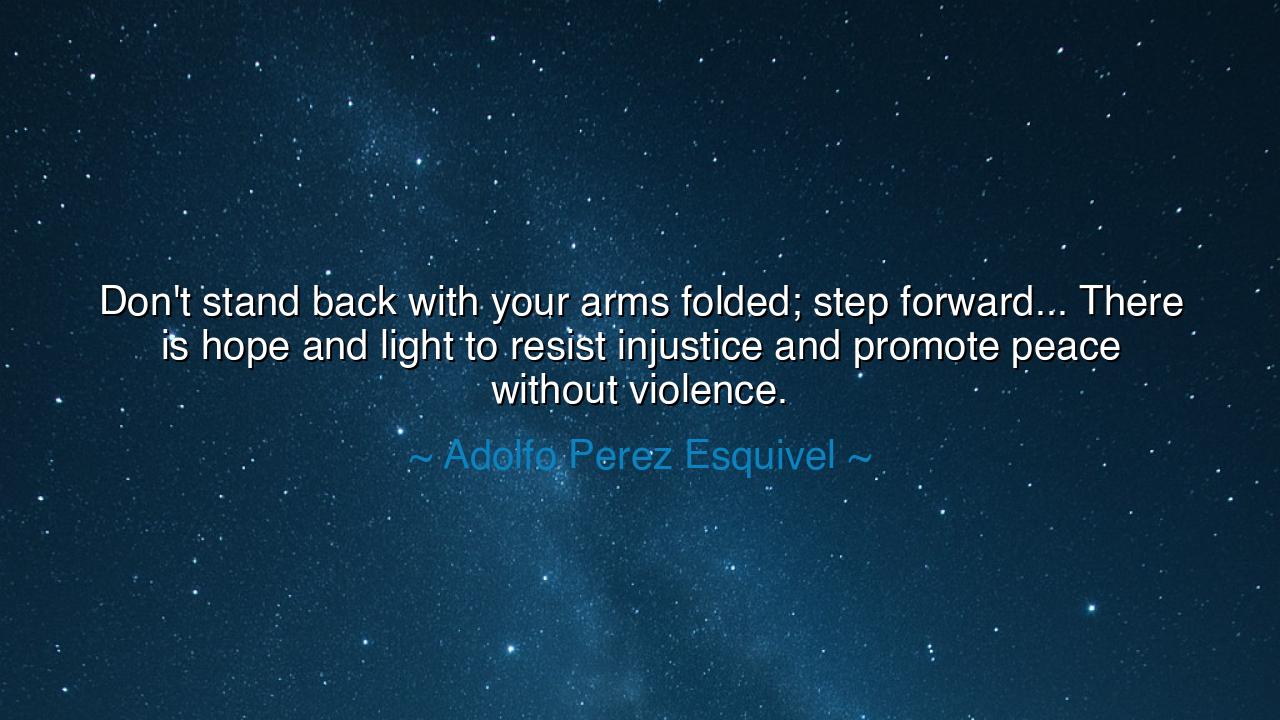
Don't stand back with your arms folded; step forward... There is
Don't stand back with your arms folded; step forward... There is hope and light to resist injustice and promote peace without violence.






In the councils of conscience, hear Adolfo Pérez Esquivel speak like a watchman on the city wall: “Don’t stand back with your arms folded; step forward… There is hope and light to resist injustice and promote peace without violence.” In one breath he rebukes passivity and blesses courage. Arms folded is the posture of spectatorship; step forward is the vow of kinship with the afflicted. He adds the twin lamps—hope and light—not as ornaments but as tools for the road, and he names the method—nonviolence—as the path where ends and means walk in the same direction.
The meaning is double. First, he calls us from safe distance into faithful presence. To resist injustice is not to rage blindly, but to move with disciplined compassion, refusing to mirror the harm we oppose. Second, his promise that there is hope and light rejects the lie of inevitability; systems built by hands can be changed by hands. The command, therefore, is not to await permission from history, but to become history’s craftsmen—building peace plank by plank, word by word, day by day. The grammar is simple: no folded arms, only forward steps.
The sentence grows out of a life tested by night. In 1980, Pérez Esquivel received the Nobel Peace Prize for defending human rights across Latin America and for championing nonviolence amid dictatorships that preferred silence to truth. In his acceptance and lecture he named nonviolence as a power that opens “new and radical perspectives” and warned that war is only a “useless spilling of blood.” Thus his exhortation is not theory but testimony: he had seen darkness; he had chosen lamps.
Consider a story from his continent. During Argentina’s last dictatorship, mothers gathered weekly in the Plaza de Mayo, circling with white kerchiefs to ask for their disappeared children. They carried no weapons—only names. The regime had its guns and its fear; they had hope, light, and one another. Their witness helped unmask lies and sustain a public conscience until the terror lost its spell. This is what “step forward” looks like: bodies in the open, truth in the mouth, violence refused. (Pérez Esquivel himself endured imprisonment and torture; he later wrote of the interior strength that sustained nonviolent resistance.)
Note the craftsmanship of his language. He does not merely say “be optimistic.” Hope is not mood; it is fuel. Light is not metaphor only; it is visibility—the refusal to let evil operate unobserved. And nonviolence is not passivity; it is strategy: it exposes, organizes, mobilizes, and persuades without surrendering the dignity of the cause. Even in Spanish echoes of his words—“No te quedes… con los brazos cruzados; paso adelante… hay esperanza y luz para resistir la injusticia y promover la paz sin violencia”—the cadence marches like a drumline for citizens.
A humbler parable makes it plain. In a neighborhood tense with fear, one shopkeeper began opening early to pour coffee for night-shift workers who felt unsafe on the walk home. Another posted a phone number for legal aid. A teacher kept evening hours to help teens fill out scholarship forms. None of these acts changed the headline overnight. But together they became a small light against predation; young people found paths; tempers cooled. This is civic nonviolence at scale: not one heroic deed, but a thousand steadfast ones.
What, then, is the lesson we should carry? First, refuse the stance of folded arms—identify one injustice within reach and choose a forward step. Second, braid hope to habit: schedule weekly acts that make good tangible (court-watching, food distribution, tutoring, accompaniment). Third, keep the method clean—promote peace without violence: no dehumanizing speech, no rumor as weapon. Fourth, protect the lamps: tell true stories, gather allies, and practice rest so your light does not burn out before dawn.
Finally, remember the cadence as a rule for your days: don’t stand back → step forward → hope → light → resist injustice → promote peace → without violence. When cynicism whispers that nothing changes, answer with the memory of those who changed everything by refusing to strike back—and by stepping, again and again, toward their neighbors. Pérez Esquivel’s line is an invitation and a charge: make your life a lantern others can walk by.






AAdministratorAdministrator
Welcome, honored guests. Please leave a comment, we will respond soon